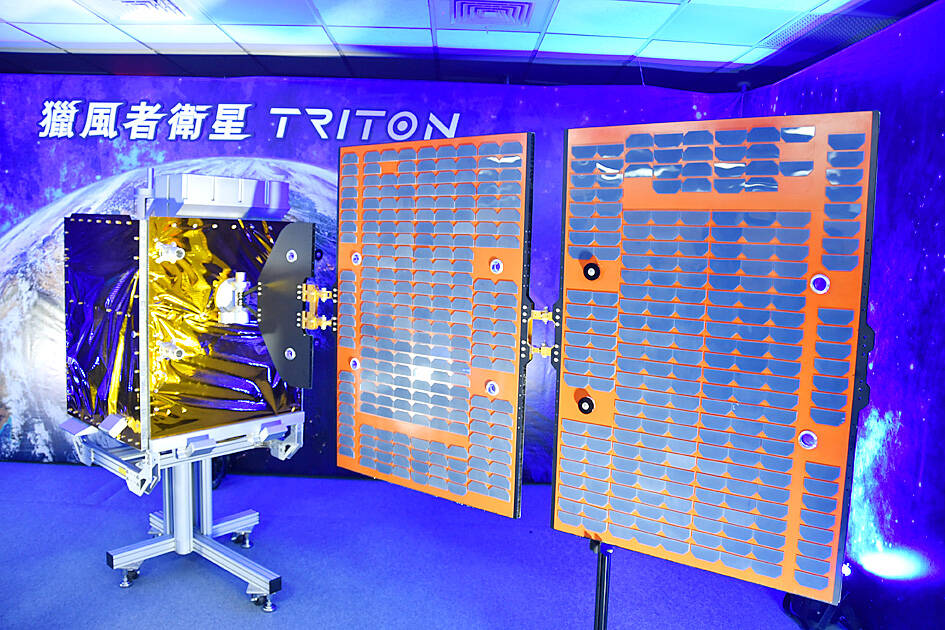The nation is slated to launch a weather satellite called Triton, or “Wind Hunter” (獵風者), in the first quarter of next year, the National Space Organization (NSPO) said.
Triton, the second domestically developed satellite after the Formosat-5, is being tested and is scheduled for a pre-shipping review next month, people with knowledge of the matter said.
Equipped with Global Navigation Satellite System Reflectometry, developed by the NSPO, the 250kg satellite is designed to receive global navigation signals while in low Earth orbit for the study of ocean-atmosphere interchange and typhoon intensity predictions.

Photo: Wu Po-hsuan, Taipei Times
Triton should help improve the accuracy of weather forecasts, especially predictions of strong wind and torrential rain.
Taiwan has allocated a budget of NT$3.5 billion (US$109.39 million) for space-related projects this year, NSPO Director-General Wu Jong-shinn (吳宗信) said.
Meanwhile, the organization’s name is scheduled to change to the Taiwan Space Agency (TASA) on Jan. 1 next year, when the Act for the Establishment of the Taiwan Space Agency (國家太空中心設置條例) takes effect after being passed by the Legislative Yuan in April.
The new agency is to be overseen by the Ministry of Science and Technology.
The TASA is to be a a nondepartmental public body with an independent budget, with an aim to match the efforts of South Korea’s space industry, Wu said.
The act intends to create an agency dedicated to conceiving and carrying out space technology projects, as well as studying and applying space technology.
The TASA is to promote international cooperation in space technology, provide the industry with guidance on relevant technologies and study the legal system related to space affairs.
Selecting, planning, operating and managing national space launch sites as well as reviewing the registration of launch vehicles and spacecraft also fall under the agency’s core areas of work.
It is also to nurture talents in space technology, promote education in space science and improve civic participation in the field.
The TASA is being established to “enhance national space technology research and development capabilities, to implement national space strategies and plans, and to promote the development of our space activities,” the act says.
The agency is expected to have 11 to 15 directors on its board, along with three to five supervisors, all with three-year terms that can only be renewed once, it said.
Additional reporting by CNA

CHANGING LANDSCAPE: Many of the part-time programs for educators were no longer needed, as many teachers obtain a graduate degree before joining the workforce, experts said Taiwanese universities this year canceled 86 programs, Ministry of Education data showed, with educators attributing the closures to the nation’s low birthrate as well as shifting trends. Fifty-three of the shuttered programs were part-time postgraduate degree programs, about 62 percent of the total, the most in the past five years, the data showed. National Taiwan Normal University (NTNU) discontinued the most part-time master’s programs, at 16: chemistry, life science, earth science, physics, fine arts, music, special education, health promotion and health education, educational psychology and counseling, education, design, Chinese as a second language, library and information sciences, mechatronics engineering, history, physical education

The Chinese military has boosted its capability to fight at a high tempo using the element of surprise and new technology, the Ministry of National Defense said in the Quadrennial Defense Review (QDR) published on Monday last week. The ministry highlighted Chinese People’s Liberation Army (PLA) developments showing significant changes in Beijing’s strategy for war on Taiwan. The PLA has made significant headway in building capabilities for all-weather, multi-domain intelligence, surveillance, operational control and a joint air-sea blockade against Taiwan’s lines of communication, it said. The PLA has also improved its capabilities in direct amphibious assault operations aimed at seizing strategically important beaches,

New Taipei City prosecutors have indicted a cram school teacher in Sinjhuang District (新莊) for allegedly soliciting sexual acts from female students under the age of 18 three times in exchange for cash payments. The man, surnamed Su (蘇), committed two offenses in 2023 and one last year, the New Taipei District Prosecutors’ Office said. The office in recent days indicted Su for contraventions of the Child and Youth Sexual Exploitation Prevention Act (兒童及少年性剝削防制條例), which prohibits "engaging in sexual intercourse or lewd acts with a minor over the age of 16, but under the age of 18 in exchange for

The High Prosecutors’ Office yesterday withdrew an appeal against the acquittal of a former bank manager 22 years after his death, marking Taiwan’s first instance of prosecutors rendering posthumous justice to a wrongfully convicted defendant. Chu Ching-en (諸慶恩) — formerly a manager at the Taipei branch of BNP Paribas — was in 1999 accused by Weng Mao-chung (翁茂鍾), then-president of Chia Her Industrial Co, of forging a request for a fixed deposit of US$10 million by I-Hwa Industrial Co, a subsidiary of Chia Her, which was used as collateral. Chu was ruled not guilty in the first trial, but was found guilty